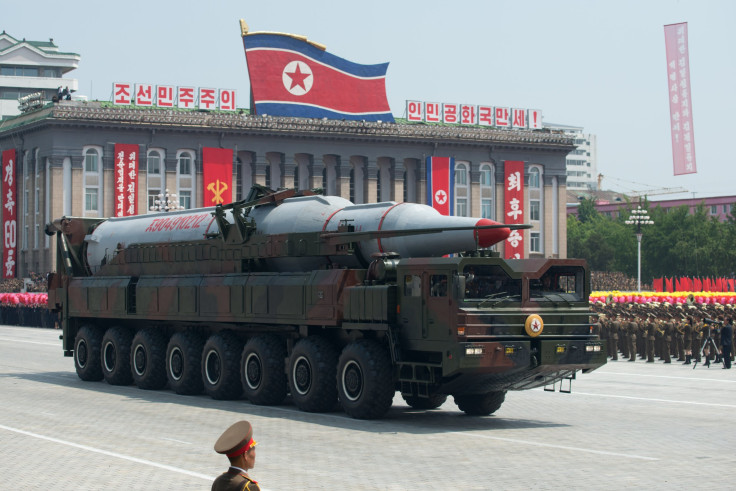North Korea Launches Missile Into East Sea; South Korea Accuses Pyongyang Of Jamming GPS Signals

North Korea on Friday launched a projectile into the East Sea, a South Korean official said, according to Yonhap. The latest launch comes as a nuclear security summit is underway in Washington, where discussions on Pyongyang’s provocations are high on the agenda.
A report by Yonhap said that Friday’s launch was the latest show of defiance by the reclusive country as the pressures mount for it to give up its nuclear ambitions. The report also cited a South Korean military official as saying that the missile was launched at the country's northeast area at about 1 p.m. local time and is believed to be a ballistic missile. The trajectory is being analyzed by the South Korean military.
North Korea conducted its fourth nuclear test in January and also test-fired several missiles since. In February, the country launched a rocket, claiming it was for scientific purposes. However, the international community saw it as a cover to test-fire its long-range missiles leading the United Nations Security Council to slap the harshest sanctions against the nation. North Korean leader Kim Jong Un has called for more nuclear warheads and better defense capabilities.
The U.S., Japan, and South Korea have reportedly warned Pyongyang to end its provocations.
On Friday, the South Korean Defense Ministry announced that North Korea has been jamming Global Positioning System (GPS) signals, a move that could further heighten tensions in the Korean peninsula, Yonhap reported. Seoul had said late Thursday that it had detected signs of jamming operations from Pyongyang.
The Defense Ministry said the jamming operations seem to be ongoing for almost a month. The Yonhap report added that the disruptions could lead to mobile phones malfunction and affect planes and ships, which rely on a GPS for navigation. Seoul’s Information and Communications Technology Ministry said Friday that though there have not been any significant mishaps, the disruptions affected 58 airplanes and 52 vessels in the country.
“North Korea is expected to continue to disrupt GPS signals in South Korea for a while in a bid to raise tension on the peninsula," Moon Sang-gyun, a South Korean defense ministry spokesman, said, according to Yonhap. He also said: “There has been no reported problems in the military or limitation to our military capability,” adding: “But if the North's GPS jamming results in real damage to airplanes or ships, we will make the North pay a due price.”
According to a South Korean military official, North Korea has over 10 varieties of GPS-jamming devices and, according to Yonhap, Kim’s regime is believed to have conducted its first jamming operation in 2012.
The South Korean military also said, according to Yonhap, that Pyongyang has been sending the disruptive signals from the North Korean port-city of Haeju in the country’s southwest area. The South Korean Defense Ministry said, according to Yonhap: “South Korea's military has sensors in place to detect North Korea's GPS jamming operations and is responding to the North's move by sharing information with relevant government agencies.”
Meanwhile, South Korea’s Ministry of Unification ministry urged North Korea to suspend its “provocation.” The ministry’s spokesman Jeong Joon-hee said, according to Yonhap: “North Korea's move to jam GPS signals itself is a provocation,” adding: “The North should immediately end such provocative acts.”
© Copyright IBTimes 2025. All rights reserved.





















